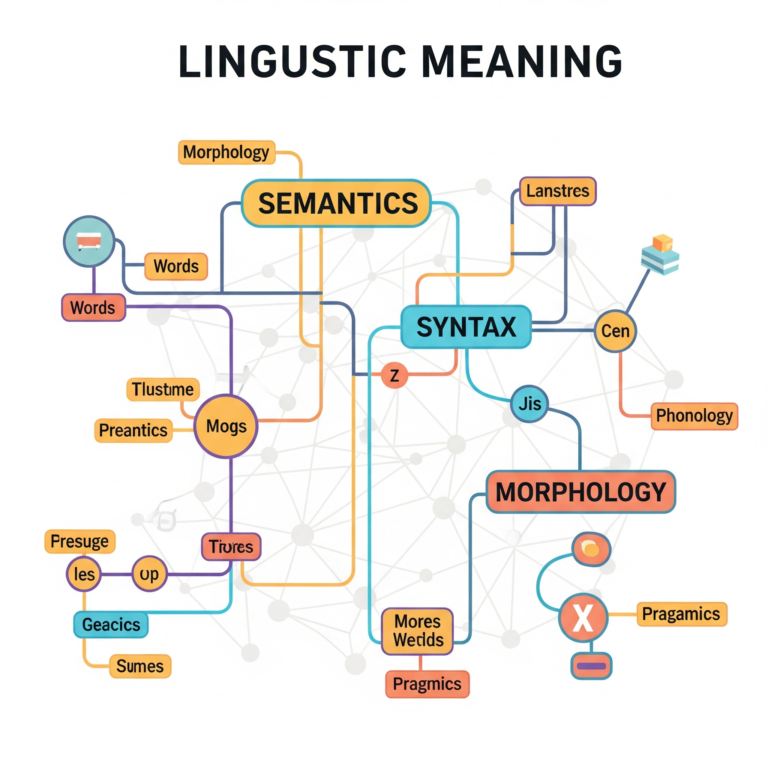Linguistic Meaning: езиково значение
Language is the cornerstone of human communication. It allows us to share ideas, express emotions, ask questions, and transmit knowledge across generations. At the heart of language lies the concept of linguistic meaning, or in Bulgarian, езиково значение. This term refers to the systematic and conventional meanings that words, phrases, and sentences carry within a language system.
Understanding linguistic meaning is essential not only for linguists and language learners but also for anyone interested in how we use language to make sense of the world around us. This article explores the nature, types, and significance of linguistic meaning, as well as its role in human communication and cultural understanding.
What is Linguistic Meaning?
Linguistic meaning can be broadly defined as the meaning encoded in linguistic expressions. This includes meanings that arise from words (lexemes), grammatical constructions, and combinations of words in larger linguistic units. It is distinct from speaker meaning, which refers to what a speaker intends to convey in a particular context.
For example, the word “apple” in English and “ябълка” in Bulgarian both refer to the same type of fruit. Though the phonetic forms differ, their linguistic meanings are functionally identical within their respective languages.
Linguistic meaning is governed by rules, patterns, and conventions that are shared by speakers of a language. These shared understandings make it possible for people to communicate effectively, despite the complexity and ambiguity that language often presents.
Main Types of Linguistic Meaning
Linguistic meaning is not monolithic. It consists of multiple components that work together to create full understanding. The most commonly recognized types include:
1. Lexical Meaning (лексикално значение)
Lexical meaning refers to the dictionary-like meaning of a word, independent of context. It is the basic conceptual content that a word carries.
Examples:
-
English: “river” → a natural stream of water.
-
Bulgarian: “река” → същото значение.
Lexical meaning can be denotative (referring to the actual object or concept) or connotative (carrying emotional or cultural associations). For instance, home and house denote similar structures but differ in connotation.
2. Grammatical Meaning (граматическо значение)
This refers to the meaning conveyed by grammatical structures such as tense, aspect, mood, number, case, and gender.
Examples in Bulgarian:
-
“маса” (table) – feminine noun
-
“маси” – plural form of the noun
Grammatical meaning helps speakers construct sentences that accurately convey time, relationships, quantity, and roles of entities in a sentence.
3. Compositional (Sentential) Meaning (съставно значение)
When words are combined into phrases and sentences, their meanings interact to produce new, more complex meanings.
Example:
-
“The dog chased the cat.” – The meaning is a combination of the meanings of individual words plus their syntactic arrangement.
In Bulgarian: “Кучето подгони котката.” – Similar compositional structure.
Compositionality is what allows language users to generate and understand an infinite number of new sentences.
4. Pragmatic Meaning (прагматично значение)
Pragmatic meaning refers to meaning in context. It goes beyond the literal meaning to include implications, speaker intentions, and situational factors.
For example:
-
“Can you close the door?” – While the sentence is a question, pragmatically it functions as a request.
In Bulgarian: “Може ли да затвориш вратата?”
Understanding pragmatic meaning requires background knowledge, cultural awareness, and sensitivity to tone and context.
Additional Dimensions of Linguistic Meaning
Semantic Meaning vs. Pragmatic Meaning
Semantics deals with meaning independent of context, while pragmatics is concerned with meaning in context. A complete understanding of language requires both perspectives.
Literal vs. Nonliteral Meaning
Language is often nonliteral. Metaphors, idioms, irony, and sarcasm all involve layers of meaning beyond the surface.
Examples:
-
“Break a leg!” – not a wish for harm, but encouragement.
-
Bulgarian equivalent: “На добър час!”
Linguistic Meaning and Language Learning
For language learners, mastering linguistic meaning involves more than just vocabulary and grammar. It requires an understanding of:
-
Cultural norms
-
Contextual cues
-
Figurative language
-
Collocations (common word combinations)
Failure to grasp linguistic meaning can result in miscommunication. For example, a literal translation of idioms can be confusing or misleading.
Why Linguistic Meaning Matters
1. Effective Communication
Without shared linguistic meanings, communication would break down. Even simple misunderstandings can lead to conflict or confusion.
2. Translation and Interpretation
Translators must navigate between different systems of linguistic meaning, often facing challenges with idioms, metaphors, and culturally specific terms.
3. Artificial Intelligence and NLP
In AI and natural language processing, understanding linguistic meaning is key to enabling machines to interpret, generate, and translate human language.
4. Cross-Cultural Understanding
Different cultures attach different meanings to similar expressions. Understanding linguistic meaning can help bridge cultural gaps.
Challenges in Studying Linguistic Meaning
Despite its importance, linguistic meaning is complex and often elusive. Challenges include:
-
Ambiguity: Words and phrases can have multiple meanings.
-
“Bank” (financial institution vs. riverbank)
-
-
Polysemy: A single word can have related but distinct meanings.
-
Context Sensitivity: The same sentence can mean different things in different contexts.
-
Idiomatic Usage: Phrases whose meanings cannot be understood from their parts.
Conclusion
Linguistic meaning — езиково значение — is a multifaceted concept that lies at the core of how language functions. It encompasses everything from the meanings of individual words to the nuances of grammar, context, and culture. Understanding linguistic meaning is vital for communication, translation, education, and technology.
Whether you are studying linguistics, learning a new language, or simply fascinated by how humans communicate, exploring the layers of linguistic meaning opens the door to a richer appreciation of the language(s) you use every day.

